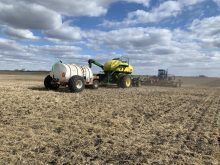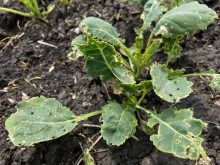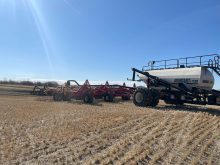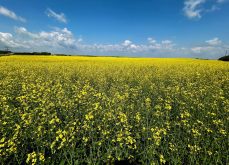Manitoba has become the first province in Canada to require biodiesel in diesel fuel.
Fuel suppliers are now legally required to include a blend of two per cent biodiesel in their overall sales of on-road and off-road diesel.
Manitoba is expected to use at least 20 million litres of biodiesel a year as a result of the mandate, which took effect Nov. 1. The province earlier exempted Manitobaproduced diesel fuel from the motive fuel tax. It will now replace the fuel tax exemption with a 14-cent-a-litre, five-year production grant for biodiesel produced in Manitoba.
Read Also

CUSMA access key among other trade noise: Seeds Canada panel
Seeds Canada conference panelists say Canada needs to stay focused and wait as U.S. trade and tariff chaos develops, and a Canada-U.S.-Mexico Agreement review looms
Speedway International in Winnipeg is the only Manitoba biodiesel company. However, two other plants are planned: one in Beausejour and another in Arborg.
Royce Rostecki, Speedway International president, said his plant isn’t actually operating, although it previously manufactured test batches of 70,000 litres. When fully operational, the plant will have the capacity to produce 20 million litres annually.
Speedway International purchases canola oil from crushers to manufacture biodiesel. It does not do its own crushing.
Currently, biodiesel used in Manitoba is imported from Alberta, Ontario and the United States. Archer Daniels Midland operates a large biodiesel crushing plant at Velma, North Dakota.
Rostecki welcomed the province’s biodiesel mandate. He’s now applying for a federal program which provides a 20-cent-a-litre incentive to Canadian biodiesel producers.
Once in operation, Rostecki hopes to use non-food grade canola seed for oil to produce biodiesel. He sees himself as an alternate market for Manitoba canola growers.
“If it unfolds the way it should for Manitoba’s agricultural sector, this is great.”
Brian Chorney of the Manitoba Canola Growers Association said anything which creates another market for canola producers is a good thing.
“It gives canola oil the opportunity to move into a higher-value market. That can be beneficial to growers.”
The two per cent blend mandated by the province is an average. It’s expected that blends will be five per cent during the summer to compensate for a lower biodiesel content in the winter because biofuels can gel in cold weather.
That isn’t a problem for newer engines but it is for older ones, according to Ian Wishart, Keystone Agricultural Producers president.
“If you get into really cold weather, you run into issues,” Wishart said. [email protected]


















